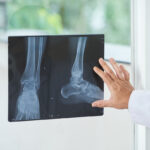Vitamin C deficiency accelerates bone loss
 (NaturalHealth365) Vitamin C is well known as a powerful antioxidant and valuable weapon against cancer and other disease. But this versatile vitamin can also prevent bone loss by preventing oxidative stress that destroys bone structure.
(NaturalHealth365) Vitamin C is well known as a powerful antioxidant and valuable weapon against cancer and other disease. But this versatile vitamin can also prevent bone loss by preventing oxidative stress that destroys bone structure.
Bone loss, known as osteoporosis, strikes older adults and can have devastating effects on mobility and quality of life. By supplementing with vitamin C, and following a healthy lifestyle to avoid toxins and other stress, you can minimize the risk of bone loss.
The stakes are high: Don’t become a victim of poor bone health
The National Osteoporosis Foundation estimates that about 54 million Americans are suffering with, or at-risk of, osteoporosis and low bone mass. Osteoporosis occurs when the body loses too much bone or makes too little bone. In some cases, both scenarios are occurring simultaneously.
The result is a weakening of the bones, causing an increase in incidence of bone breakage, even from a relatively minor fall. In the most severe cases, victims of osteoporosis can break a bone simply by bumping into something around the house – or even from just sneezing. Osteoporosis is more widespread than many realize. About one in two women and as many as one in four men aged 50 and older will break a bone in because of osteoporosis.
Patients are being misguided and mistreated
There is a mountain of information about bone health and how to avoid osteoporosis. Unfortunately, nearly all of it is wrong. The most common mistake is the idea that calcium can reverse bone loss. This misconception no doubt came about because osteoporotic bone is definitely deficient in calcium. But consuming large amounts of calcium have no effect on improving the conditions of the disease.
While additional calcium in the diet may show some improvement on a bone density test, those results are deceiving. Calcium is merely improving the test results from a superficial standpoint. It is doing nothing to strengthen the bone from within and safeguard against fracture.
Is your doctor telling you the truth about poor bone health?
Osteoporosis is actually scurvy of the bones, a symptom of vitamin C deficiency. Its reversal is dependent on restoring an optimal balance of antioxidants, particularly vitamin C – which helps promote the growth of new, healthy bone. Appropriate mineral intake is also necessary for optimal function of these antioxidants within the bone.
Deficiencies in antioxidants cause oxidative stress, which affects the bone, decomposing it over time. Resolving this oxidative stress is not as simple as taking a supplement, however, since the cause of the stress should also be addressed. But vitamin C plays a key role in an overall approach to minimizing bone loss because of its incredible efficiency in relieving oxidative stress.
Good news about the power of vitamin C for bone strength
Supplementing with vitamin C has been shown to improve bone density test results with strong, structurally sound bones, as well as reduce the risk of fracture. Research has shown vitamin C plays a pivotal role within the structural matrix of the bone itself, forming and cross-linking collagen, developing other non-collagen bone matrix proteins, regulating cells that are forming collagen and cartilage in the bone, as well as differentiating stem cells into bone cells.
Researchers at Mount Sinai School of Medicine were the first to demonstrate in an animal model that vitamin C actively protects against osteoporosis. Researchers there found that supplementing with vitamin C prevented bone loss in mice. Similar findings were documented in the International Journal of Experimental Pathology by researchers at Kyungpook National University in Daigu, Korea, who found that vitamin C deficiency caused failure of collagen synthesis, leading to symptoms of scurvy, including spontaneous bone fracture.
Take a comprehensive approach to avoid osteoporosis
There are a number of steps you can take for preventing and reversing osteoporosis. This comprehensive approach will address oxidative stress as well as get at the cause of that stress:
1. Eradicate old infections, detoxify your body and minimize new toxin exposure.
2. Address any critical hormone deficiencies.
3. Optimize antioxidant levels by supplementing with vitamin C, preferably a high-quality powder and liposome encapsulated forms.
4. Consider additional recommended dietary supplements, including lysine and proline, complete B complex, beta carotene, vitamin D3, vitamin K2, omega-3 fatty acids, magnesium glycinate, and mixed tocopherols.
5. And, of course, consider weight-bearing exercise like, walking, jogging or hiking. Plus, strength training exercises like, dumbbell chest presses, push ups, lunges and squats. If you don’t know how to exercise properly, consider working with a health coach or fitness professional. The rewards are worth the effort.
Sources for this article include:



